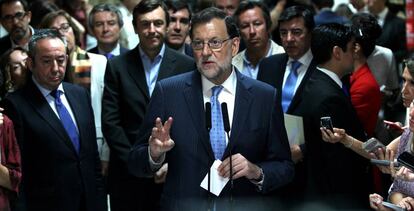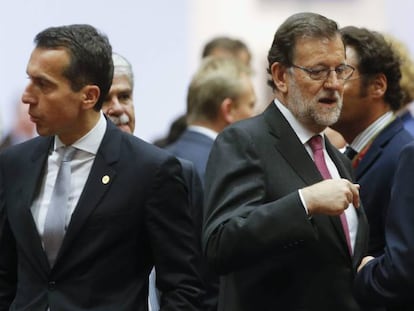Felipe González asks Socialists not to obstruct a PP government “if necessary”
Former statesman asks parties to act responsibly to avoid a third election, and acting PM Mariano Rajoy agrees that an executive must be formed quickly

At a time when Spanish politics has already witnessed several unusual events – including a repeat general election and more than six months of a caretaker government – former Socialist statesman Felipe González is raising eyebrows by asking his party not to obstruct a government by the Popular Party (PP).
Even as the Socialist Party (PSOE) insists on denying congressional support for the reinstatement of acting Prime Minister Mariano Rajoy, González, who was Spain’s longest-serving prime minister (1982-1996), is insisting on the need to form a government as soon as possible “after losing eight months in a strange interim situation.”
In an opinion piece published Thursday in EL PAÍS, González said that Rajoy must take the initiative and seek support from other parties, while the Socialists should listen, talk and, “in case of need,” not obstruct a PP government.
Socialists say no for now
The Socialist Party, which is holding a meeting of its federal committee on Saturday, said it respects González’s opinion but is not planning to go down that road for now.
“The PP leader cannot hope to govern with 137 seats aided by abstention,” said Óscar López, the Socialist spokesman in the Senate. And Andalusian premier Susana Díaz said that the Socialists cannot be “accomplices to the pain and suffering” caused by Rajoy’s policies since he won the 2011 election.
But some regional party leaders are not closing the door to reviewing this position if there is a new situation of gridlock in Congress.
“It is beyond imagination to have a repeat situation of what we experienced after December 20, much less now that the PP obtained 14 additional deputies and that an alternative is just about impossible,” he wrote, alluding to the failure of cross-party negotiations following the inconclusive first election.
If parties fail to reach deals once again, Spain could be facing a third election.
“Citizens will understand that, at this point in my life, I am reaffirmed in giving priority to the general interests of Spain and its citizens above anything else,” said González, 74. “The Socialist Party cannot and must not enter into a coalition with the PP. It must occupy its position responsibly in the opposition. But political forces have a responsibility: if they cannot form a government themselves, they cannot obstruct another government from being formed.”
Also on Thursday, acting Prime Minister Mariano Rajoy called González’s opinion on the issue “very qualified” and agreed on the need to avoid a third election. “Citizens are sick and tired,” he said.
He also agreed with González that an executive must be formed “as speedily as possible.”
“There is no call for wasting all summer,” he told reporters in Congress. “I don’t know what we could fix in August that we cannot fix in July.”
The caretaker prime minister noted that no bills have been sent to parliament since September 2015, when the original election campaign began
His words suggested that he is planning to stand for a reinstatement vote on the last week of July. Justice Minister Rafael Catalá has also said that the investiture debate could be held the last week of July, after the new congressional term of office begins.
Rajoy is pressuring for the investiture debate to be held as soon as possible, citing the need for Congress and the Senate to approve the spending ceiling – a necessary step prior to getting the 2017 budget passed. He has also invoked the need to start making decisions in connection with the EU, including potential sanctions for overshooting the deficit target, and the recent Brexit vote.
The caretaker prime minister noted that no bills have been sent to parliament since September 2015, when the original election campaign began.
But Rajoy did not disclose whether he knows what the Socialists’ position will be at the investiture vote.
“[Socialist leader] Pedro Sánchez has not told me his opinion, and if there was one, whether it is definitive or not,” he said.
English version by Susana Urra.
Tu suscripción se está usando en otro dispositivo
¿Quieres añadir otro usuario a tu suscripción?
Si continúas leyendo en este dispositivo, no se podrá leer en el otro.
FlechaTu suscripción se está usando en otro dispositivo y solo puedes acceder a EL PAÍS desde un dispositivo a la vez.
Si quieres compartir tu cuenta, cambia tu suscripción a la modalidad Premium, así podrás añadir otro usuario. Cada uno accederá con su propia cuenta de email, lo que os permitirá personalizar vuestra experiencia en EL PAÍS.
En el caso de no saber quién está usando tu cuenta, te recomendamos cambiar tu contraseña aquí.
Si decides continuar compartiendo tu cuenta, este mensaje se mostrará en tu dispositivo y en el de la otra persona que está usando tu cuenta de forma indefinida, afectando a tu experiencia de lectura. Puedes consultar aquí los términos y condiciones de la suscripción digital.









































